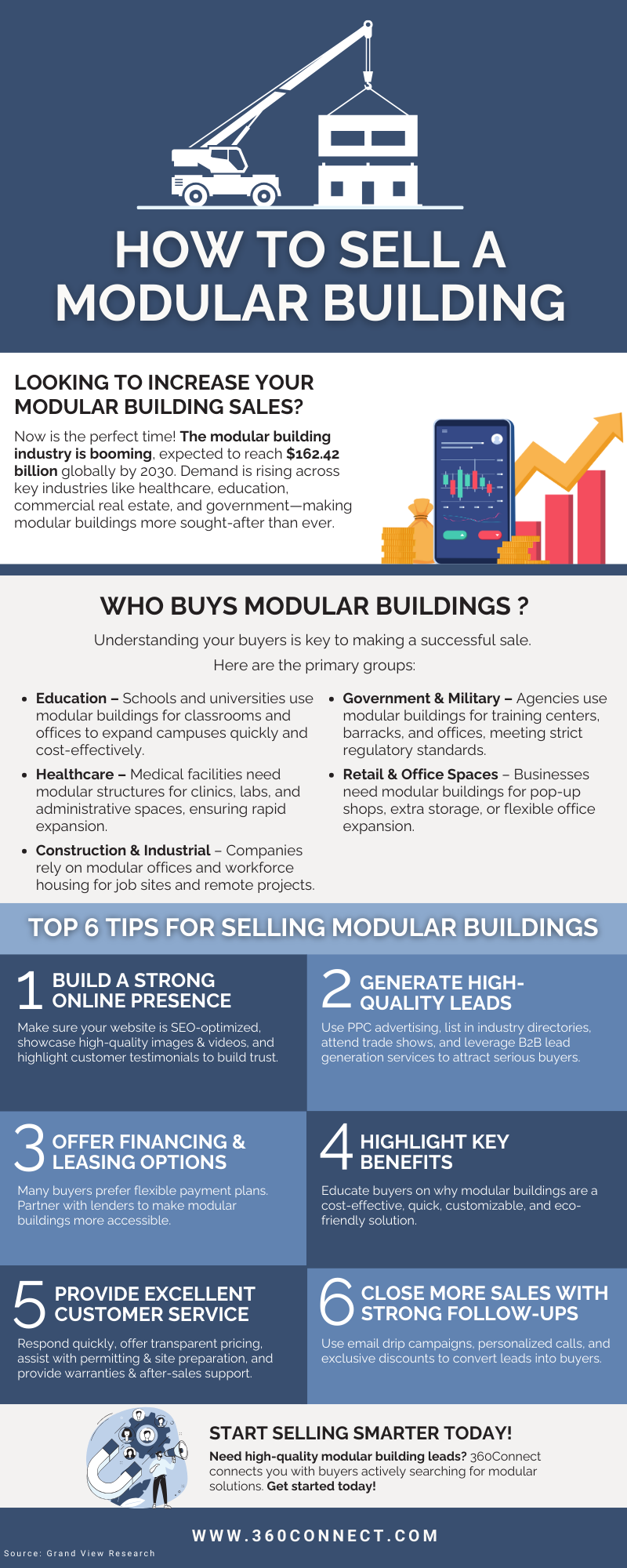Selling modular buildings can be a profitable business, but success depends on having the right sales strategy. Whether you’re targeting schools, businesses, or industrial clients, knowing how to position your product and connect with the right buyers is key. In this guide, we’ll walk you through the best ways to sell modular buildings, generate leads, and grow your business.
Before we dive into selling strategies, here’s a quick look at the modular construction market:
- Global growth: The modular building industry is booming, expected to hit $162.42 billion globally by 2030.
- U.S. market expansion: Projected to grow from $10.53 billion in 2022 to $19.17 billion by 2030
- High demand: Key industries include healthcare, education, commercial real estate, and government
- Sales opportunity: Faster, cost-effective, and eco-friendly building solutions make modular buildings more attractive than ever

This rising demand means that now is a great time to sell modular buildings.
Who Buys Modular Buildings?
Modular buildings serve a variety of industries, and understanding your ideal buyer is essential. Some of the most common markets include:
- Education – Schools and universities often use modular buildings for classrooms and administrative offices. With the growing demand for additional space in educational institutions, modular buildings provide a cost-effective and flexible solution for expanding campuses without disrupting daily operations.
- Healthcare – Medical facilities need modular buildings for clinics, labs, and administrative spaces. Many hospitals and healthcare providers turn to modular buildings to quickly expand their facilities while maintaining quality patient care.
- Construction & Industrial – Companies use modular structures for temporary offices and workforce housing. These buildings are popular among construction firms that need on-site offices, break areas, or employee housing in remote locations.
- Government & Military – Agencies often purchase modular buildings for training facilities, barracks, and offices. Government contracts for modular buildings are common, as these structures meet strict regulations and can be rapidly deployed where needed.
- Retail & Office Spaces – Businesses need modular buildings for additional workspace or retail expansions. Entrepreneurs and small business owners often choose modular buildings for pop-up shops, additional storage, or flexible office space without the cost of traditional construction.
By defining your ideal customer, you can tailor your marketing and sales approach to meet their specific needs.
Modular Building Buyer Personas
Understanding the industries that use modular buildings is essential, but equally important is identifying who within those industries are your decision-makers. Here are some key buyer personas to consider:
- Business Owners & Property Owners – Many small business owners or commercial property investors seek modular buildings as an affordable way to expand their operations or add workspace.
- General Contractors & Construction Managers – Contractors often recommend modular buildings for temporary office spaces, worker housing, or storage solutions on job sites.
- Facilities Managers – Larger businesses, schools, and healthcare facilities often rely on facilities managers to source modular buildings for expansion or renovations.
- Procurement Officers – Government agencies, military branches, and large corporations often have dedicated procurement officers who handle sourcing and purchasing modular structures.
- Developers & Investors – Real estate developers and investors look for modular buildings as a way to quickly develop properties with minimal costs and construction time.
By understanding these buyer personas, you can tailor your sales pitch, marketing materials, and outreach strategy to better engage the actual decision-makers in the buying process.

6 Tips on How to Sell Modular Buildings
Now that you know who buys modular buildings, it’s time to focus on how to sell them effectively. Whether you’re new to the industry or looking to refine your strategy, these six practical tips can help you stand out in the market and increase your sales.
1. Build a Strong Online Presence to Attract Buyers
Most buyers start their search online, so having a professional website and digital marketing strategy is critical. Here’s how you can optimize your online presence:
- SEO-Optimized Website – Ensure your website is optimized for search terms like “modular buildings for sale.” Implementing keyword-rich content, optimized meta descriptions, and internal linking will improve your site’s visibility on search engines.
- High-Quality Images & Videos – Showcase your modular buildings with professional photos and virtual tours. Buyers are more likely to engage with listings that provide clear visuals of the product.
- Customer Testimonials – Build trust by featuring success stories and reviews from past clients. Testimonials from satisfied customers can be a powerful selling point.
- Educational Content – Content marketing via blog posts, case studies, and guides can help educate buyers on the benefits of modular buildings. Providing valuable information positions your company as an industry expert.
2. Generate High-Quality Leads
To sell modular buildings efficiently, you need a steady stream of qualified leads. Here are some ways to generate leads:
- PPC Advertising – Run Google Ads targeting businesses and industries that need modular buildings. Paid advertising can provide immediate visibility for your business.
- Industry Directories – List your business in online directories specific to the modular building industry. Many B2B buyers use directories to find suppliers.
- Networking & Trade Shows – Attend industry events and expos to connect with potential buyers. These events allow face-to-face interactions with decision-makers looking for modular building solutions. (Related: The Top 3 Modular Building Associations)
- B2B Lead Generation Services – Partner with an online marketplace to connect with buyers actively searching for modular buildings. Outsourcing lead generation helps streamline the sales process.
3. Offer Financing & Leasing Options
Many buyers prefer flexible payment options. Providing financing or leasing plans can make modular buildings more accessible to businesses with budget constraints. Partner with lenders who specialize in commercial building financing to offer attractive payment solutions. Some benefits of financing include:
- Lower upfront costs for buyers
- More predictable budgeting for businesses
- Increased likelihood of closing a sale
4. Highlight the Benefits of Modular Buildings
Educate buyers on why modular buildings are a smart investment:
- Cost-Effective – Lower construction costs compared to traditional buildings. Modular buildings often require fewer materials and labor expenses.
- Quick Installation – Faster setup times mean businesses can operate sooner. Unlike traditional construction, modular buildings are built off-site and installed quickly.
- Customizable – Modular buildings can be tailored to different industries and needs. Whether a buyer needs a specialized workspace or additional storage, modular solutions are flexible.
- Eco-Friendly – Sustainable materials and energy-efficient designs make modular buildings a green choice. Many modular structures use recycled materials and offer energy-efficient insulation.
5. Provide Excellent Customer Service
Great customer service can set you apart from competitors. Ensure your team:
- Responds quickly to inquiries – Prompt responses show potential buyers you value their business.
- Provides clear and honest pricing information – Transparency in pricing builds trust and reduces buyer hesitation.
- Assists with permitting and site preparation – Many buyers need guidance on installation requirements. Offering support in this area can increase conversions.
- Offers warranties and after-sales support – A strong warranty program gives buyers confidence in their investment.
6. Close More Sales with a Strong Follow-Up Strategy
Not every buyer is ready to purchase immediately. Follow up with leads using email marketing, phone calls, and personalized outreach. Provide additional information, answer their questions, and offer incentives to help move them closer to a decision. Consider the following follow-up strategies:
- Email drip campaigns – Send a series of emails with educational content, product highlights, and limited-time offers.
- Personalized phone calls – A follow-up call can address concerns and provide tailored solutions to hesitant buyers.
- Exclusive discounts – Offering a limited-time discount or promotion can encourage buyers to take action sooner.
Final Thoughts
Selling modular buildings successfully requires a combination of targeted marketing, strong lead generation, and excellent customer service. By identifying your ideal buyers, building an online presence, and leveraging financing options, you can increase sales and grow your business.
Need Quality Modular Building Leads?
If you’re looking for high-quality, verified, modular building leads, 360Connect connects suppliers like you with buyers actively searching for your solutions. Get started today and take your sales to the next level!

Further Reading: More Sales Tips
Looking to sharpen your sales approach? These resources can help:

